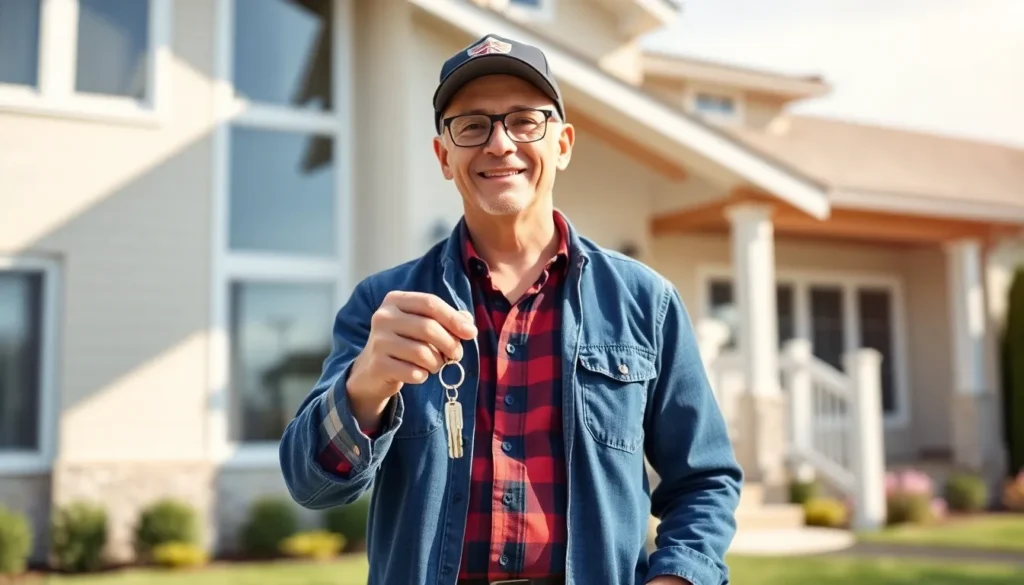Table of Contents
ToggleNavigating the world of home loans can feel like trying to solve a Rubik’s Cube blindfolded. But fear not! For veterans and active-duty service members, VA loans offer a golden ticket to homeownership without the usual headaches. With no down payment and no pesky private mortgage insurance, it’s like finding a unicorn in your backyard—rare and magical.
Overview of VA Loan Qualifications
VA loan qualifications encompass various criteria that veterans and active-duty service members must meet to obtain this beneficial financing option. Eligibility hinges on service record, often necessitating a minimum period of active duty or discharge under conditions other than dishonorable.
Documentation plays a crucial role. Applicants supply a Certificate of Eligibility (COE) to confirm eligibility, which requires proof of military service. This document outlines specific service lengths based on dishonorable discharge or any other circumstances impacting eligibility.
Credit scores require attention. Lenders typically seek scores above 620 but emphasize that VA loans don’t have a minimum score established by the VA itself. Borrowers with lower scores may still qualify, depending on the lender’s guidelines.
Debt-to-income ratio (DTI) affects the loan process too. A DTI of 41% is standard, yet higher ratios are sometimes permissible with compensating factors like significant assets or income. Lenders examine financial stability and ability to manage monthly payments.
Property requirements exist. The VA only backs loans on primary residences, which facilitate homeownership for veterans. Homes must meet safety, soundness, and sanitation standards, ensuring a quality living environment.
Funding fees also play a role in qualifications. Fees depend on service length and down payment amounts, yet these fees can be rolled into the loan amount. Waivers may apply for veterans with service-connected disabilities, enhancing affordability.
Understanding these qualifications clarifies the VA loan application process, enabling veterans and active-duty service members to navigate toward homeownership.
Eligibility Requirements

Veterans and active-duty service members must meet specific qualifications to obtain a VA loan. These requirements ensure that those who have served the country gain access to homeownership benefits.
Service Time and Type
Eligible service time includes active duty, reserve, and National Guard. Active-duty members must serve for at least 90 consecutive days during wartime or 181 days during peacetime. Reservists are typically eligible after six years of service in the Selected Reserve. Additionally, some types of active duty may affect eligibility, such as members who qualify under specific orders. Each branch of service has different criteria for qualifications based on service type.
Discharge Status
Discharge status significantly impacts VA loan eligibility. A discharge characterized as honorable qualifies veterans for VA loans. General discharges may still warrant eligibility, but other discharge types, such as dishonorable or bad conduct, might disqualify applicants. Exceptions exist based on certain cases associated with service-related issues. It’s crucial for applicants to review discharge documentation to confirm eligibility for VA loan benefits.
Credit Score and Financial Criteria
Credit score and financial criteria play a significant role in obtaining a VA loan. Although the VA doesn’t set a minimum credit score requirement, most lenders seek scores above 620 for loan approval.
Minimum Credit Score
Minimum credit scores vary by lender, with many preferring scores in the mid-600s. Higher credit scores typically lead to better loan terms, including lower interest rates. Veterans and service members aiming to qualify for a VA loan should focus on improving their scores by managing debts and maintaining timely payments. Checking credit reports regularly helps identify any inaccuracies that might lower a score.
Debt-to-Income Ratio
Debt-to-income ratios serve as a crucial factor in VA loan eligibility. This ratio compares total monthly debts against gross monthly income. Lenders often prefer a DTI ratio of 41% or lower for VA loans. Exceeding this percentage may impact approval chances. Keeping debts manageable and avoiding new loans can help maintain an ideal DTI ratio. VA loans also allow certain exclusions, making this qualification more favorable for many applicants.
Documentation and Application Process
Understanding the documentation and application process for a VA loan is crucial for veterans and active-duty service members. It simplifies the journey toward homeownership.
Required Documents
Gather essential documents for a VA loan application. A valid Certificate of Eligibility (COE) proves eligibility status. Bank statements show financial stability and sufficient funds. Recent pay stubs provide evidence of income. Tax returns from the last two years help verify earnings. Additionally, proof of service records supports the claim for loan benefits. Collecting these documents ensures a smoother application experience.
Steps to Apply
Follow specific steps to apply for a VA loan. Start by obtaining a COE through the VA website or a lender. Choose a lender approved for VA loans to guide you through the process. Complete the loan application, providing all required documentation. Lenders then review financial information and assess creditworthiness. Once approved, the lender provides a loan estimate detailing terms. The final step involves closing, during which the loan is finalized, allowing access to funds for home purchase.
Common Myths About VA Loans
Many misconceptions surround VA loans, causing confusion for potential borrowers. One myth suggests that VA loans only apply to active-duty service members. In reality, veterans who meet eligibility requirements can also access these benefits.
Another common myth is that a perfect credit score is necessary. While maintaining a credit score above 620 is advantageous, the VA does not enforce a minimum credit score.
People often believe that VA loans require a down payment. However, VA loans offer the unique benefit of no down payment, making homeownership more accessible.
It’s also a misconception that obtaining a VA loan takes an excessively long time. The application process, when properly organized, can proceed efficiently, particularly with the required documents prepared in advance.
Some think that all discharges are eligible for VA loans. Only those with an honorable discharge qualify, as other types of discharges might limit access to VA benefits.
Additionally, there’s a belief that personal savings matter for VA loans. While savings can contribute positively, many veterans afford homes without additional cash reserves due to the no-down-payment feature.
Finally, misconceptions exist surrounding the funding fees associated with VA loans. Although funding fees are standard, exceptions exist for veterans with service-connected disabilities, who may qualify for exemptions.
Understanding these myths allows veterans and active-duty service members to approach the VA loan process with accurate information, optimizing their chances for successful homeownership.
Navigating the VA loan process can be a game changer for veterans and active-duty service members seeking homeownership. With no down payment and flexible credit requirements it’s designed to make home buying more accessible. Understanding the qualifications and documentation needed empowers borrowers to take full advantage of these benefits.
By dispelling common myths and clarifying eligibility criteria, service members can approach the VA loan process with confidence. The path to owning a home doesn’t have to be complicated. With the right information and preparation, achieving homeownership through a VA loan is within reach.





